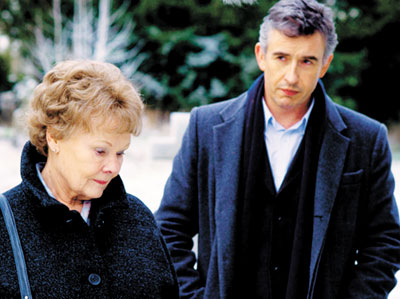|

真人真事改编《菲洛梅娜》
Based on the 2009 book “The Lost Child of Philomena Lee” by BBC reporter Martin Sixsmith, this film tells the story of a woman who tries to find her long lost son.
As an unmarried young woman pregnant in the 1950s, Lee was sent to an Irish-Catholic convent* and saw her boy, Anthony, sold to wealthy new parents. For years, she abided by* the convent’s agreement not to follow his whereabouts*, but in 2003, Lee (Judi Dench) regrets her decision and agrees to have Sixsmith (Steve Coogan) record her journey to America trying to find out what has happened to Anthony.
Advertised as an odd-couple road comedy, the film sees funny things happening along the way.
Having just lost his recent job as a Labor government adviser, Sixsmith finds a job as a reporter, which was in fact his first job.
The journey provides a chance for recovery* for both Lee and Sixsmith, who looks down upon doing a soft human interest story. Human-interest stories, he says, are about weak-minded, vulnerable* people for weak-minded, vulnerable people.
However, he is struck by Lee’s story. “Evil nuns,” he says, “evil is good, story-wise.”
Having co-written the film with Jeff Pope, Coogan’s character and screenplay are cynical* towards the institutions* of journalism*, politics and religion*. Dench’s character is the very opposite. She is sympathetic*, a bit naive, and even shows a determination* when the occasion calls for it.
She is driven by a deep regret for the child she never knew, and a frustration* as to the value of any belief that has robbed her life of such joy. Sixsmith serves as an angry, atheistic* foil* to a woman defined by hope as much as sadness.
At the center of the film is the relationship between Lee and Sixsmith. The relationship is next to friendship, but with a businesslike formality. Lee softens Sixsmith, and it is nice to see how the relationship naturally grows.
(SD-Agencies)
|

